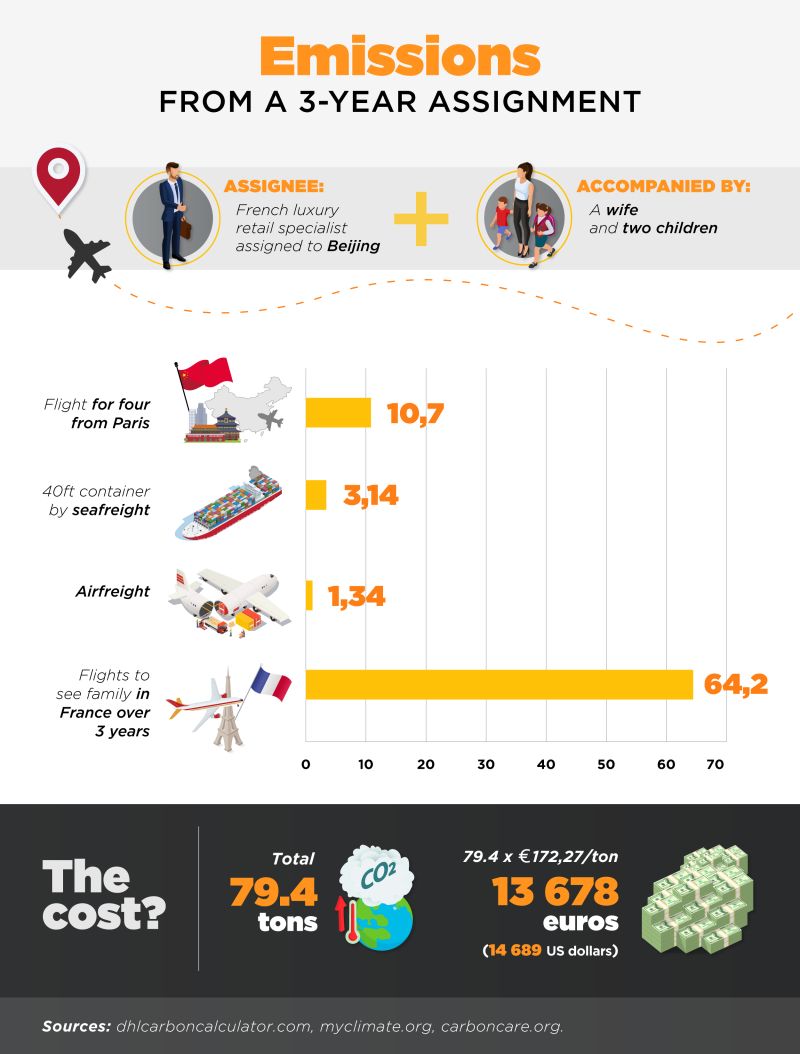Global mobility and climate change: Can we still travel the world for work?

Balancing the demands of global mobility with environmental responsibility is a growing challenge for businesses. This article explores the environmental impact of global mobility programs, including relocations and business travel. It also provides practical strategies for companies to reduce their carbon footprint while still offering attractive programs to their employees.
Climate change is a pressing issue, and businesses are increasingly looking to reduce their environmental impact. This extends to global mobility (GM) programmes, which can have a significant carbon footprint.
The High Cost of Global Mobility
While GM offers numerous benefits for companies, it comes at an environmental expense. To entice employees to relocate with their families, companies often provide expensive incentives, like frequent flights home or complete household relocations. As creatures of habit, humans tend to cling to their home comforts and are often resistant to change. Therefore, offering additional perks, like having the company cover the cost of relocating your entire life, can be an enticing proposition.
However, facilitating such relocations necessitates the use of containers. While container ships are considered one of the most energy-efficient shipping methods, especially when compared to air freight, they still have drawbacks. Overseas shipping contributes to approximately 3% of global emissions, with container ships being among the major polluters, many of which still rely on heavy oil.
In addition to CO₂ emissions, the discharge of ballast water from these ships poses a threat to ecosystems by introducing foreign species. Noise pollution generated by container ships disturbs marine wildlife, while wastewater discharge further contaminates the ocean. Moreover, the environmental devastation caused by oil spills serves as a stark reminder of the potential consequences of maritime transportation.
The Bottom Line Impact of Climate Change
A recent US study valued carbon emissions at $185 per ton, significantly higher than current European taxes (around $65). Let's consider a family of four relocating from Paris to Beijing. Their 10-ton container shipment emits 3.14 tons of CO₂, while their flights add another 10.7 tons. Factoring in air freight (roughly 1.34 tons) and potential return trips (6 in a 3-year assignment adding another 64.2 tons), the total CO₂ emissions reach a staggering 79.4 tons. This excludes the family's lifestyle choices within the host country and the environmental impact of furnishing a new home.
For perspective, the average French citizen emitted 4.91 tons of CO₂ in 2019, and China's average was 7.61 tons.

How Emissions Could Affect Your GM Programme
While 79 tons may seem insignificant compared to a company's overall footprint, the financial implications are significant. With potential CO₂ taxes of $65 per tonne, companies could face additional costs of over $5,000 for a single expat family. If the US study's price point prevails, these costs could balloon to over $14,000.
Currently, these costs are often borne by society, but governments are starting to implement CO₂ taxes. The shipping and aviation industries are resisting, but change is inevitable. Recent examples include:
- The International Maritime Organisation (IMO) considering a $300-$400 tax per tonne of heavy oil.
- France introducing an eco-tax on flights departing from their airports.
- The US potentially implementing a carbon tax.
- Germany and China introducing CO₂ taxes and Cap-and-Trade systems, respectively.
The legislative landscape is shifting, and privileges for these industries are likely to shrink or disappear entirely in the coming years. While GM programmes are currently only indirectly taxed (e.g., company car fuel tax), it's crucial to prepare for these upcoming changes.
Reducing Your Organisation's Emissions Costs
While relocation flights and home visits are unavoidable for some assignments, there are ways to minimise the environmental impact of GM programmes.
- Location selection: Cities with robust public transportation (like Paris) can significantly reduce the need for cars, a major source of emissions.
- Flexible programmes: Offering remote work options or train travel for shorter relocations within the EU can encourage sustainable choices by employees.
- Furnished apartments: Eliminating the need for container shipments and the stress of relocation can be an attractive option for assignees.
- Commuting incentives: Companies can encourage employees to take public transport or cycle by covering expenses and highlighting its time-saving benefits, as explained in studies by the Center for Desease Control and Prevention.
Balancing Sustainability with Employee Needs
While environmental considerations are crucial, it's equally important to address employee needs and expectations. Building flexibility into GM programmes can make sustainable choices more attractive, especially with incentives.
For instance, offering extended stays in the home country during assignments or virtual schooling options for children can help ease the transition and encourage employees to choose environmentally friendly options.
As the world grapples with climate change, businesses that prioritise sustainability will be at a competitive advantage. By implementing these strategies and fostering a culture of environmental awareness, companies can ensure their GM programmes remain sustainable and attractive to employees. This not only benefits the environment but also demonstrates the company's commitment to responsible global citizenship.
Here are some additional considerations for the future of GM programmes in a changing climate:
- Technological advancements: Video conferencing and collaboration tools can potentially reduce the need for some business travel. Companies should embrace these technologies and explore how they can be effectively integrated into GM programmes.
- Cultural awareness: Sustainability initiatives should be culturally sensitive. What works in one country might not be feasible or well-received in another. Open communication and collaboration with employees throughout the relocation process are key.
- Policy advocacy: Businesses can play a vital role in advocating for sustainable practices within the relocation industry. This could involve supporting initiatives to develop greener shipping and aviation technologies, or lobbying governments to implement fairer environmental regulations.
By taking a proactive approach to sustainability, companies can ensure their mobility programmes continue to be a valuable tool for attracting and retaining top talent in a globalised world.
This article has been published with the help of AGS. For over 10 years, AGS has chosen EasyExpat.com to communicate about its international services and offers. You can find more information and request a free quote with the link below.
Editorial Team :)